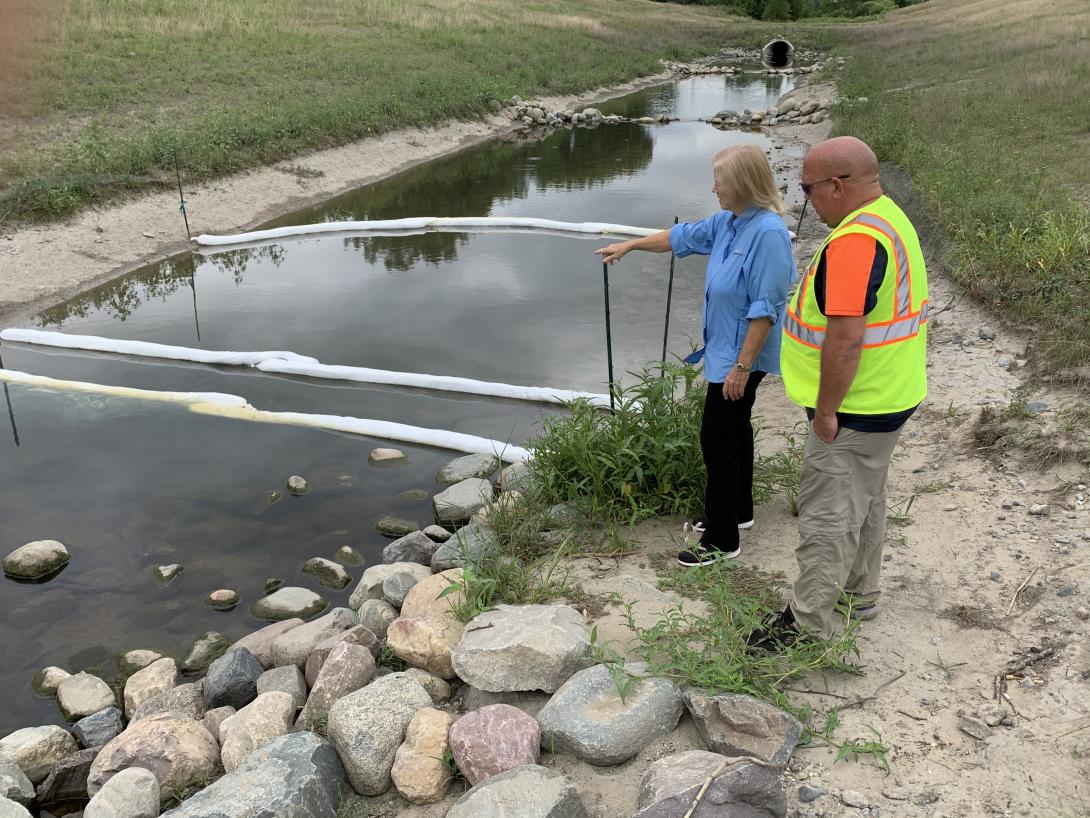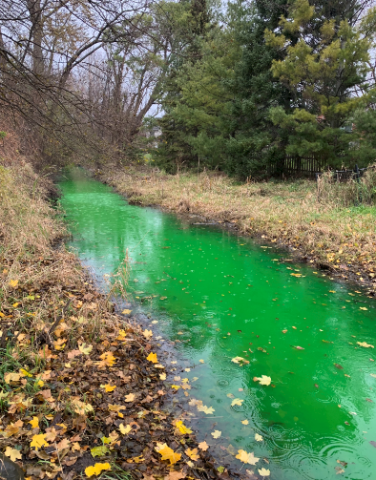Report a polluter:
24-hour toll free emergency hotline
1-877-679-4337
If a discharge is detected in a Macomb County drain, please contact the Macomb County Public Works Office.

Did you know?
The two greatest sources of water quality problems in the Clinton River and Lake St. Clair are polluted storm water runoff and illicit discharges that contain bacteria and nutrients.

Runoff is rain or snowmelt that carries pollutants such as sediment, nutrients, and bacteria off the land through the storm water drainage system into a water body.
Illicit discharges occur when sewage or other wastewater that should be directed to a sanitary sewer system or onsite sewage treatment system (septic system) is released into a storm drain system. Illicit discharges can release large quantities of harmful bacteria and pollutants into our rivers and lakes.
Failing septic fields, direct connections between household plumbing and storm drains and spilling, dumping, and pumping are all sources of illicit discharges. Identification and elimination of illicit discharges is necessary to protect our water supply and prevent water borne illnesses.
The Illicit Discharge Elimination Program (IDEP) is part of an ongoing effort to reduce the amount of pollution entering the Clinton River and Lake St. Clair. The goal of the IDEP project is to decrease the amount of sanitary sewage and non-sanitary discharges that enter the Clinton River and Lake St. Clair through illicit connection into the storm water drainage system. By eliminating illicit discharges, we are able to address the number one concern for residents of Macomb County: Sewage entering the Clinton River contributing to beach closings.
Illicit discharges to ditches and drains flowing into the Clinton River and Lake St. Clair are major contributors to the pollution problems that have plagued Lake St. Clair. Macomb County and its local communities realize their responsibility for protecting this valuable resource. Macomb County is committed to a long-term sustained effort to preserve and protect the Clinton River and Lake St. Clair.
When to call
Please contact us if you observe:
- A strong sewage odor
- Discharges or dumping of pollutants into drains, ditches, ponds, lakes or rivers
- Sewage on the ground surface
Be prepared to give the following information:
- Location of complaint
- Source of pollution, if known
- Responsible party, if known
- Any other relevant observations
You may remain anonymous if you desire.
During business hours
Staff from the Macomb County Health Department Environmental Health Services Division, Office of Public Works and Department of Roads will be available to receive complaints Monday through Friday, 8:30 a.m. to 5 p.m. During these times, please call:
Macomb County Health Department - 586-469-5236
Macomb County Office of Public Works - 586-469-5325
Macomb County Department of Roads - 586-463-8671
24-hour hotline call:
1-877-679-4337
The Macomb County Public Works Office has established a 24-hour hotline that will be available to accept water pollution complaints after normal business hours. If your call is of an urgent nature, on-call staff will be notified to take action. All other calls will be responded to on the next business day.
Prevent illicit discharges
Only rain in the drain.
Never dump motor oil, chemicals, pet waste or dirty wash water down the storm drain or into ditches. All of these materials pollute our lakes and streams.
Scoop it.
Keep pet waste cleaned up from lawns, sidewalks and streets and away from drainage ditches and storm drains. When dog waste is left behind, it washes into storm drains and ditches. From there, it heads straight to your local lakes and streams.
Sweep it.
Fertilizer left on sidewalks and driveways will easily wash into storm drains and ditches. So, save money and our lakes and streams by sweeping fertilizer back onto the lawn.
Water wisely.
Generally, your lawn needs about one inch of water a week. Extra water overwhelms sewage treatment plants and water retention basins, especially during heavy rains, and contributes to combined sewage overflows. Excessive water usage can also cause the premature failure of septic systems.
Use less for pests.
Use herbicides and pesticides sparingly. Many of these materials are harmful to kids, pets and the environment. Apply in problem areas only and away from paved surfaces and drainage paths.
Maintain it.
Properly operate and maintain your onsite septic system. Discharges from malfunctioning systems can impair water quality (including the water quality at public bathing beaches). Septic system maintenance information is available from the Macomb County Health Department.
Identify it.
Be aware of household materials that can harm children, pets and the environment. If you see the words “danger”, “caution”, "warning” or “toxic”, you’re probably handling a household hazardous waste. Contact your local community or the Macomb County Health Department for locations and dates for disposal of these materials.
For more information regarding IDEP activities, please contact:
Macomb County Health Department
Environmental Health Services Division
43525 Elizabeth Road
Mt. Clemens, Michigan 48043
586-469-5236
macombgov.org/Health-Home
Macomb County Public Works
Commissioner Candice S. Miller
21777 Dunham Road
Clinton Township, MI 48036
586-469-5325
macombgov.org/PublicWorks-Home
Macomb County Department of Roads
117 S. Groesbeck Highway
Mt. Clemens, Michigan 48043
586-463-8671
http://www.rcmcweb.org







